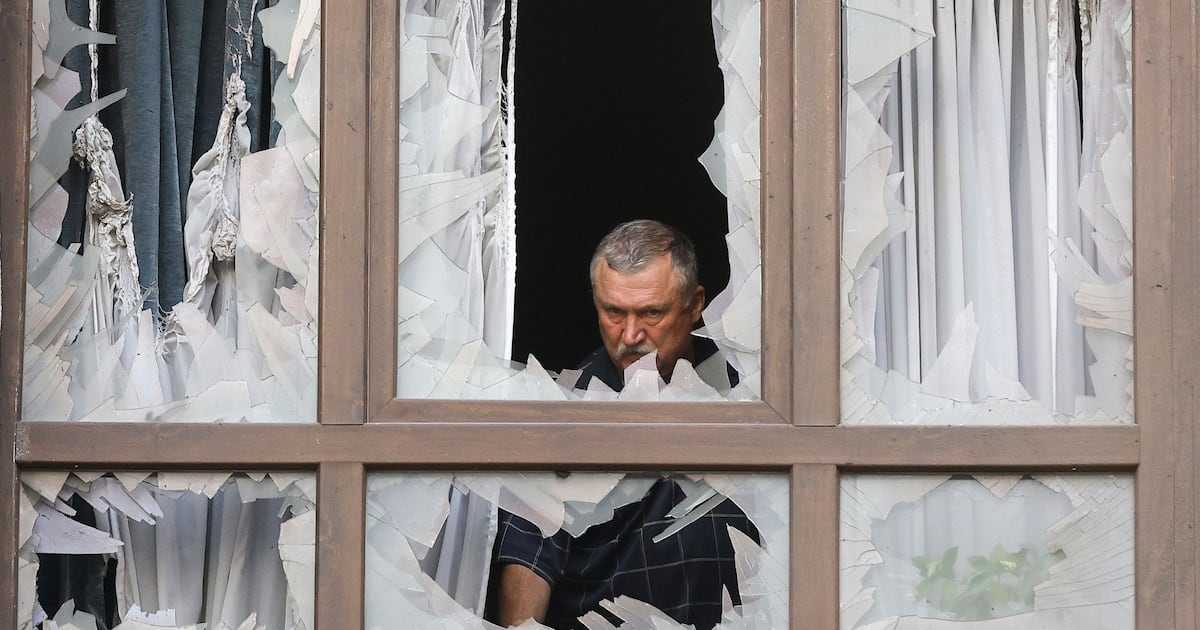World
Kyiv Residents Face Intensifying Russian Attacks and Anxiety

Kyiv residents awoke on Monday, July 10, 2023, to the aftermath of another night marked by intense Russian air attacks. The assault included drone and missile strikes that left at least one person dead and eight injured. Smoke enveloped several districts of the city as hospitals treated the wounded, and damage to civilian infrastructure caused delays for commuters in the capital of 3.5 million.
The recent surge in drone attacks, particularly in Kyiv, represents a troubling escalation. Ukrainian officials reported that overnight, Russia launched 426 drones and 24 missiles, with many intercepted or jammed by air defence systems. Yet the toll on civilians continues to rise, exacerbating the stress and fatigue endured over more than three years of full-scale conflict.
Growing Concerns Among Residents
As drone strikes become more frequent, many residents are grappling with heightened anxiety. Nazar, a lifelong Kyiv resident, expressed his shifting perspective: “When people asked me whether I was worried about living in Kyiv, I would say that yes, it’s being shelled and bombed, but it’s well-protected. That’s how it felt until a few weeks ago.” He noted that recent attacks have felt closer, diminishing the sense of safety he once had.
Olesya, another resident living on the eighth floor of a nearby apartment, described the increasing danger. She explained, “While before I would have stayed in my flat during an alert, now, if there are too many drones flying overhead, I go into the corridor of the building for greater protection.” This reflects a broader trend, as residents adapt their routines to the realities of war.
For many, the sight and sound of drones overhead have become a terrifying part of daily life. Nazar compared the noise to something from a World War II film, saying, “They make a particular annoying, threatening noise, which speeds up as they’re about to hit a target.” He now finds himself seeking shelter in underground areas during the early morning hours.
Military Developments and Civilian Impact
The Russian attacks are not limited to Kyiv; cities further west, such as Ivano-Frankivsk, also experienced heavy bombardment, with local officials reporting injuries and significant damage. As the conflict intensifies, so do concerns regarding Ukraine’s air defences. The United States recently paused the supply of critical weaponry but later announced plans to provide additional air defence systems to Kyiv through a new deal with NATO.
Germany and other European countries are expected to supply advanced US-made Patriot systems, although the timing and scale of this support remain uncertain. Viktoriya, a resident near the Dnipro River, shared her perspective on the current situation, stating, “Before, the majority was repelled. But now I don’t think we have enough air-defence assets or manpower to track everything, so they do get through.”
The psychological impact of these attacks is profound. Many residents, feeling the weight of constant danger, have begun to make more systematic preparations. On July 8, during one of the heaviest attacks, around 32,000 people sought refuge in Kyiv’s metro stations, including nearly 2,200 children. This marked a significant increase in the number of night-time visits to the metro, which are expected to surpass the previous month’s figures.
Despite the ongoing turmoil, some residents display resilience. “I don’t think we are depressed or saying this is the end of Ukraine,” Nazar noted. “Surprisingly, I have more resilience than I thought, and I think people are on the same page in that way.”
As the conflict continues, the situation in Kyiv remains precarious. The emotional toll on residents is evident as they navigate life under the threat of air attacks, balancing the desire for normalcy with the need for safety.
-

 Top Stories3 months ago
Top Stories3 months agoTributes Surge for 9-Year-Old Leon Briody After Cancer Battle
-

 Entertainment4 months ago
Entertainment4 months agoAimee Osbourne Joins Family for Emotional Tribute to Ozzy
-

 Politics4 months ago
Politics4 months agoDanny Healy-Rae Considers Complaint After Altercation with Garda
-

 Top Stories4 months ago
Top Stories4 months agoIreland Enjoys Summer Heat as Hurricane Erin Approaches Atlantic
-

 World5 months ago
World5 months agoHawaii Commemorates 80 Years Since Hiroshima Bombing with Ceremony
-

 Top Stories3 months ago
Top Stories3 months agoNewcastle West Woman Patricia Foley Found Safe After Urgent Search
-

 Top Stories5 months ago
Top Stories5 months agoFianna Fáil TDs Urgently Consider Maire Geoghegan-Quinn for Presidency
-

 World5 months ago
World5 months agoCouple Convicted of Murdering Two-Year-Old Grandson in Wales
-

 World5 months ago
World5 months agoGaza Aid Distribution Tragedy: 20 Killed Amid Ongoing Violence
-

 World5 months ago
World5 months agoAristocrat Constance Marten and Partner Convicted of Infant Murder
-

 Top Stories4 months ago
Top Stories4 months agoClimbing Errigal: A Must-Do Summer Adventure in Donegal
-

 Top Stories4 months ago
Top Stories4 months agoHike Donegal’s Errigal Mountain NOW for Unforgettable Summer Views









